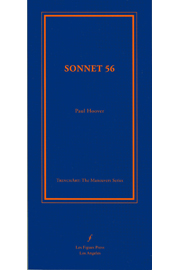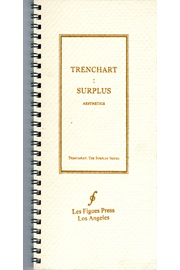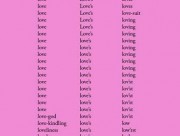Words of Love
Mark Rutkoski
Introduction by Annette Gilbert, translated by Vivien Knussi
Cover art by Klaus Killisch
Book 4 of 6, TrenchArt Surplus Series
Poetry | Visual Art | $15.00
ISBN 13: 978-1-934254-39-4
Size: 9.25 x 4.25
Pages: 123
Binding: Softcover, Perfect
BUY NOW at LARB BOOKS
Taking its title from a 1966 pop song by The Mamas and the Papas, Words of Love is an index of the words and their frequency in the complete sonnets of William Shakespeare. The text includes:
160 loves, 16 hates, 8 summers, 5 winters, 7 virtues, 1 vice, 1 virgin.
12 die, 2 died, 1 dies, 1 dying, and 1 diest.
489 ands, 163 buts, 80 ors.
344 marks of I, 164 of me and 62 mines. 113 yous.
3 thrices, 2 saucys,
and 1 canker-blooms.
Words of Love is both art object and literary experiment, investigating poetry through the lens of accumulation. Replacing the structural repetition of the sonnet form with pure repetition of words, Rutkoski disassembles the construct of love as erected by its most iconic architect. This text is for anyone who knows the truth of the lyrics, “worn out phrases and longing gazes / won’t get you where you want to go.”
Praise for Words of Love:
“…The complete dissolution of the sonnets absolves the reader from relying on their biographically-driven narrative construction. Instead, with the serial ordering of the words he can go on a microscopic search for the poetic, graphic, and semantic subtleties. This is so relevant for Shakespeare’s cycle: ‘By frustrating our desire for story, Shakespeare teaches his readers—especially later readers—how to read in a new way.’ It may be said that in Mark Rutkoski’s Words of Love, the act of varying repetition compels a new, updated form of reading that is sensitized to the poetic qualities of the words themselves.”
—Annette Gilbert,
“Anagrams, concordances and deformances, heat maps and Markov chains, network diagrams, search engines, variorum editions, word clouds…no digital hobbyhorse has been ridden quite as hard as Shakespeare’s Sonnets. Close your browser for a moment and attempt to forget the incessant stream of data visualization and statistical analysis. Here, our Rival Poet is intent on exporting the Bard back to the confines of the codex, with a twist. The simplicity of composition – {sort shake-speare_sonnets.txt > rutkoski_words-of-love.txt} – addresses the failure of prosody through a failure in computation. Sheer surplus of iterative indexicality, each of these 17,500 words radiate into a dark domain far beyond the love of data. As Mama Cass (the Dark Lady) tells Buddy Holly (the Fair Youth): you oughta know by now—words of love, soft and tender, won’t win a girl’s heart anymore. Freed from the malfunctions of poetry, this index produces a baseline of patterned homogeneity to introduce the linguistic glitch that just might get you where you want to go.
—Danny Snelson
“Mark Rutkoski’s Words of Love numbers and alphabetizes all the words in Shakespeare’s 154 sonnets. The conceptual project may first seem written at the expense of lyric-making. That is far from the case. It’s thrilling to see facing pages filled with only the word ‘to,’ astonishing to learn that the word ‘trees’ appears only once and the word ‘tree’ not at all. Sweetness of word relations is unavoidable, because the alphabet seeks such joy: ‘slow / slumbers / sluttish / small / small / smell / smell / smell / smell / smell / smells / smiling / smoke / smother / snow / so.’ On pages 48-49, it’s thrilling to encounter six columns of ‘I’ falling like the word-rain in Apollinaire’s visual poem ‘Il pluet.’ Don’t mock modern moiety; much mud, murderous muse. Make room, Gertrude Stein.”
— Paul Hoover
“[Words of Love] emphasizes the ways that literary language becomes dematerialized. The historical specificity of Shakespeare’s text is utterly effaced, in an exaggerated version of the same way that same specificity has been erased and re-erased by the countless public domain reiterations of the Sonnets in both paper and digital format.”
—K. Silem Mohammed, Poetry Foundation







